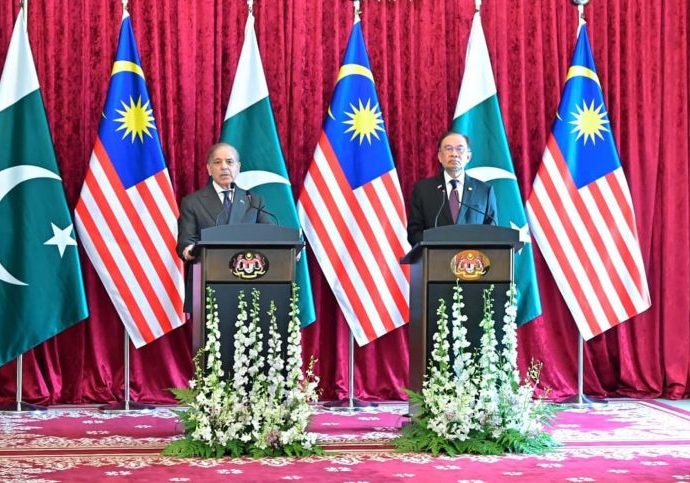Islamabad (Staff Reporter) – Prime Minister Muhammad Shehbaz Sharif has emphasized Pakistan’s desire to transform its longstanding and deep-rooted relations with Malaysia into a sustainable strategic partnership, highlighting the potential for enhanced cooperation in various sectors including trade, tourism, technology, and agriculture.
Addressing the Pakistan-Malaysia Business and Investment Conference held on Monday, Prime Minister Shehbaz Sharif, alongside Malaysian Prime Minister Anwar Ibrahim, underscored the importance of strengthening business-to-business connections between the two countries. He noted that the private sector has a critical role to play in realizing these goals.
“Pakistan and Malaysia share brotherly relations spanning decades,” he stated. “Our discussion today was highly constructive, and both sides agreed on boosting bilateral trade. Prime Minister Anwar Ibrahim is deeply interested in enhancing economic cooperation between our countries.”
PM Sharif pointed out that Pakistan’s economy is anchored in agriculture, with the country already exporting agricultural products to multiple nations, including Malaysia. He also noted Pakistan’s demographic advantage, with a large youth population that could be empowered through modern technology and artificial intelligence.
He emphasized the immense potential in Pakistan’s tourism sector, citing regions like Gilgit-Baltistan, Hunza, Nanga Parbat, and K2 as globally attractive destinations. “Collaboration between Pakistani and Malaysian companies in tourism can be a game changer,” he said.
The Prime Minister also highlighted the possibility of joint ventures to provide skilled workforce to Gulf countries and said Malaysia could benefit from investing in Pakistan’s mineral-rich regions, such as Reko Diq in Balochistan.
Shehbaz Sharif reassured investors that Pakistan’s economy is moving towards stability, with significant reductions in inflation and policy rates. He confidently stated that Pakistan will not require another IMF program in the next two years if current progress continues. “If Pakistan and Malaysia move forward together, we can bid farewell to the IMF,” he added.
He praised PM Anwar Ibrahim’s visionary leadership, noting Malaysia’s impressive development under his guidance, and lauded his understanding of business and economics.
PM Sharif noted that Pakistan is the world’s fifth-largest producer of milk and cotton, and fourth-largest producer of mangoes. He expressed confidence in the global demand for high-quality Pakistani fruits, vegetables, and related products. He thanked PM Anwar for increasing the halal meat quota from Pakistan to Malaysia to $200 million, and assured Pakistan’s full commitment in meeting its export obligations.
He also stressed that governments must ensure a business-friendly environment, but it is ultimately the private sector that must take the lead in joint ventures, business-to-business partnerships, and technology sharing.
Malaysian Prime Minister Anwar Ibrahim, while addressing the conference, said Malaysia is keen to strengthen trade ties with Pakistan. He emphasized the need for increased cooperation under platforms like ASEAN to drive regional economic freedom and growth.
“There is great potential for collaboration between Pakistan and Malaysia,” he said, adding that doors are open for Pakistani companies to operate in Malaysia.
He praised the vision of Quaid-e-Azam Muhammad Ali Jinnah, calling him a great leader, and acknowledged the presence of thousands of Malaysian students studying in Pakistan as a sign of strong educational and cultural ties.
PM Anwar expressed his intention to remove trade barriers in collaboration with PM Shehbaz Sharif and affirmed Malaysia’s commitment to investing in Pakistan. He also acknowledged Shehbaz Sharif’s effective leadership and its role in Pakistan’s development.


